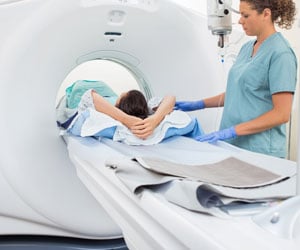- Artificial Intelligence (AI) and brain scanning can predict which treatment is best for depression
- The AI technology will help to choose the right antidepressant that will benefit the patient most
- This technology has the potential to bring about a revolution in the Psychiatry field
The research team is confident that modern tools, such as AI, coupled with electroencephalography (EEG) and blood tests, could revolutionize the field of Psychiatry in the near future.
The study, published in Nature Biotechnology, was led by Dr. Madhukar Trivedi, MD, who is a Professor in the Department of Psychiatry at UT Southwestern Medical Center, Dallas, Texas, USA. He is also Chief of the Division of Mood Disorders and the Founding Director of the Center for Depression Research and Clinical Care, where he holds the Betty Jo Hay Distinguished Chair in Mental Health and the Julie K. Hersh Chair for Depression Research and Clinical Care.
Dr. Amit Etkin, MD, PhD, who is a Professor of Psychiatry and Behavioral Sciences at Stanford University, was a study collaborator who helped in developing the algorithm.
EEG Studies: Key Features
- Over 300 patients with depression were included in the study
- The patients were randomly assigned to the following two groups:
- Group 1: Patients received a class of antidepressant called SSRI (Selective Serotonin Reuptake Inhibitors)
- Group 2: Patients received a placebo (a substance having no therapeutic effect and used as a control)
- EEG was used to measure brain electrical activity before beginning treatment
- A machine-learning algorithm was developed to analyze the EEG data and make predictions
- AI technology predicted the following:
- Treatment Outcome: Identification of patients who would benefit from the medication over a span of 8 weeks
- Alternative Therapies: Suggest alternative therapies (psychotherapy or brain stimulation) if the patients were unlikely to benefit from the medication
- Three additional patient groups were used to validate the results
EMBARC Trial: Key Features
- The EMBARC Trial was a multicenter trial which was coordinated by Dr. Madhukar Trivedi
- The key features of the EMBARC Trial are as follows:
- The trial was designed to identify bio-signatures of depression
- The trial was conducted at four US sites over a period of 16 weeks
- The aim of the trial was to establish biology-based, objective strategies to treat depression
- Elucidate why 66 percent of patients don’t respond to their first antidepressant
- Brain imaging by Magnetic Resonance Imaging (MRI), blood tests and DNA (deoxyribonucleic acid) tests were used to evaluate patients with major depressive disorder
“There are many signatures of depression in the body,” says Trivedi. “Having all these tests available will improve the chances of choosing the right treatment the first time.”
Antidepressant Use: A Mounting Problem in USA
The use of antidepressants in the US has grown at an alarming rate over the last couple of decades. Based on data published by the National Health and Nutrition Examination Survey (NHANES), antidepressant use has increased by almost 65 percent – from 7.7 percent in 1999-2002 to 12.7 percent in 2011-2014.Trivedi explains: “The expanded use of medications makes it more critical to further understand the underpinnings of depression and ensure patients are prescribed an effective therapy.”
Future Plans
The research team is planning to integrate the AI technology interface with EEG hubs across the US, as well as apply for USFDA (US Food and Drug Administration) approval.The research team is also embarking on two other large-scale projects that are briefly highlighted below:
- Dallas 2K (D2K) Study: This is a long-term study, spanning over 20 years and aims to identify bio-signatures that will help in making treatment decisions. It will also study the biological mechanisms involved in depression and its response to antidepressant therapy. The study will include 2,000 patients above the age of 10 years, suffering from mood disorders.
- Resilience in Adolescent Development (RAD) Study: This is a 10-year study that will involve 1,500 participants aged between 10-24 years. The study aims to identify risk factors that impact depression in youths. This will enable a better understanding of the factors that influence resilience in children, adolescents and young adults who are at a higher risk of developing mood and anxiety disorders.
Concluding Remarks
“These studies have been a bigger success than anyone on our team could have imagined,” says Trivedi. “We provided abundant data to show we can move past the guessing game of choosing depression treatments and alter the mindset of how the disease should be diagnosed and treated.”Trivedi concludes: “It can be devastating for a patient when an antidepressant doesn’t work. Our research is showing that they no longer have to endure the painful process of trial and error.”
Funding Source
The study was funded by the National Institute of Mental Health, the Stanford Neurosciences Institute, the Hersh Foundation, the National Key Research and Development Plan of China, and the National Natural Science Foundation of China.Reference:
- An Electroencephalographic Signature Predicts Antidepressant Response in Major Depression - (https://www.nature.com/articles/s41587-019-0397-3)
Source-Medindia
















